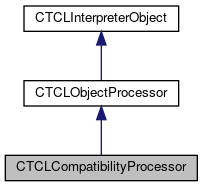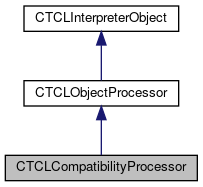#include <TCLCompatibilityProcessor.h>


Public Member Functions | |
| CTCLCompatibilityProcessor (CTCLProcessor &actualCommand) | |
| virtual | ~CTCLCompatibilityProcessor () |
| virtual int | operator() (CTCLInterpreter &interp, std::vector< CTCLObject > &objv) |
| virtual void | onUnregister () |
 Public Member Functions inherited from CTCLObjectProcessor Public Member Functions inherited from CTCLObjectProcessor | |
| CTCLObjectProcessor (CTCLInterpreter &interp, std::string name, bool registerMe=true) | |
| virtual | ~CTCLObjectProcessor () |
| void | Register () |
| Tcl_Command | RegisterAs (std::string name) |
| void | unregister () |
| void | unregisterAs (Tcl_Command token) |
| std::string | getName () const |
| Tcl_CmdInfo | getInfo () const |
 Public Member Functions inherited from CTCLInterpreterObject Public Member Functions inherited from CTCLInterpreterObject | |
| CTCLInterpreterObject (CTCLInterpreter *pInterp) | |
| CTCLInterpreterObject (const CTCLInterpreterObject &aCTCLInterpreterObject) | |
| CTCLInterpreterObject & | operator= (const CTCLInterpreterObject &aCTCLInterpreterObject) |
| int | operator== (const CTCLInterpreterObject &aCTCLInterpreterObject) const |
| CTCLInterpreter * | getInterpreter () const |
| CTCLInterpreter * | Bind (CTCLInterpreter &rBinding) |
| CTCLInterpreter * | Bind (CTCLInterpreter *pBinding) |
Additional Inherited Members | |
 Protected Member Functions inherited from CTCLObjectProcessor Protected Member Functions inherited from CTCLObjectProcessor | |
| void | bindAll (CTCLInterpreter &interp, std::vector< CTCLObject > &objv) |
| void | requireAtLeast (std::vector< CTCLObject > &objv, unsigned n, const char *msg=0) const |
| void | requireAtMost (std::vector< CTCLObject > &objv, unsigned n, const char *msg=0) const |
| void | requireExactly (std::vector< CTCLObject > &objv, unsigned n, const char *msg=0) const |
 Protected Member Functions inherited from CTCLInterpreterObject Protected Member Functions inherited from CTCLInterpreterObject | |
| CTCLInterpreter * | AssertIfNotBound () |
Detailed Description
This is an adapter pattern class between object based commands and the classic argc/argv command interface. See the CTCLProcessor class for more information. The idea is that a CTCLProcessor will contain one of these which will marshall the object interface parameters to the argc/argv interface, create at CTCLResult object and then dispatch to the CTCLProcessor so that old commands written using the argc/argv interface can continue to work even if Tcl 9.0 deprecates or even eliminates this interface.
Constructor & Destructor Documentation
◆ CTCLCompatibilityProcessor()
| CTCLCompatibilityProcessor::CTCLCompatibilityProcessor | ( | CTCLProcessor & | actualCommand | ) |
Construct the object. The assumption is that the CTCL processor is constructed 'enough' that we can pull out the command name, and the interpreter from it.
- Parameters
-
actualCommand : CTCLProcessor Object that implements an old style argc/argv command.
- Note
- the CTCLProcessor required a two-step construct/register, we enforce that by not allowing the base class constructor to register us.
◆ ~CTCLCompatibilityProcessor()
|
virtual |
Destruction is all taken care of by the base class destructor.
Member Function Documentation
◆ onUnregister()
|
virtual |
Adapt to actual commands command deletion handler.
Reimplemented from CTCLObjectProcessor.
◆ operator()()
|
virtual |
Called to execute the command. Here's where the serious adaptor work comes in to play. We need to turn the objects passed in to us into an argc/argv pair, and create a CTCLResult to give the command we're adapting for.
- Parameters
-
interp : CTCLInterpreter& Interpreter that's running this command objv : vector<CTCLOBject>& Reference to the vector of command line objects.
- Returns
- int
- Return values
-
from m_ActualCommand->operator()
Implements CTCLObjectProcessor.
The documentation for this class was generated from the following files:
- libtclplus/include/tclplus/TCLCompatibilityProcessor.h
- libtclplus/tclplus/TCLCompatibilityProcessor.cpp
 1.8.13
1.8.13